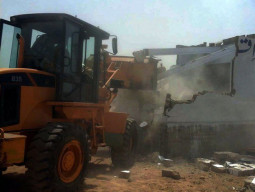
The Supreme Court has ordered the revenue officials to complete the survey of unregistered state land within three months and use the Google Earth software to keep an eye on encroachments on state land.
“In this age of Global Positioning System (GPS), government officials are still submitting old manual maps of Karachi,” wondered Justice Amir Hani Muslim as the Supreme Court resumed the hearing of the suo motu case on Karachi violence on Wednesday.
Justices Anwar Zaheer Jamali, Khilji Arif Hussain, Sarmad Jalal Osmany, Amir Hani Muslim and Gulzar Ahmed took up the case. Despite a gap of five days, the mood of the judges did not seem to have cooled down as one official after the other was raked over the coals for not adhering to court directives.
In 2005, the Sindh High Court had ordered conducting a survey of lands owned by the state in 93 dehs of the province. The order was passed to stop illegal encroachments. In the last hearing, the Sindh chief secretary, among other officials, was issued contempt of court notices for not carrying out the survey.
On the last hearing, the judges were handed maps of unregistered state lands in Karachi on their orders. “Even the maps submitted in the court are manipulated,” claimed Justice Muslim.
“In the past, only one man named Malik Bola Khan owned 100 acres of land along the Super Highway and the rest was all owned by the state. Today, a number of people claim to own land along the highway from Gadap to Jamshoro,” the judge speculated.
Regarding the delay, AG Fattah Malik said that several chief secretaries had been changed during the period and suggested referring the matter to the committee constituted by the apex court under the chair of SHC chief justice.
The bench also highlighted the involvement of revenue department officials in the encroachment over the state lands. The chief secretary has moved a summary to the chief minister seeking approval to initiate work on surveying, claimed Fattah Malik.
“I cannot imagine disobeying, disrespecting or flouting the court order. I may be pardoned for the same,” Sindh chief secretary Raja Muhammad Abbas submitted admitting that delays in compliance of orders was caused by the revenue officers.
“The non-compliance was neither intentional nor deliberate but owing to the reasons given above,” he explained.
Abbas requested the judges to grant him one year to conduct the survey of unregistered (na-class) state lands, saying the task was technical and time consuming. The court ordered however that the survey should be completed within a period of three months.
The judges further ordered that the maps of Karachi should be downloaded through the archives portal in the Google Earth software every five years to see how much land had been encroached.
Convicts released on parole
“The convicts tried under anti-terrorism law cannot be released on parole even if remissions are notified by the president,” the judges noted while questioning the criteria adopted for the release of convicts.
The IG Prisons gave the court a list showing 193 convicts were released during the last five years in the province. From prisons in Karachi, 87 convicts were released, 83 from Sukkur and 23 from Hyderabad. An officer said that Sindh had adopted the Punjab’s Good Conduct of Prisoners Probational Release Act, 1926. The bench was of the view that an impression was being created that courts were releasing the accused despite the fact that the legislation was not effective and rules were not being followed by the government officers themselves.
Presence of Taliban
The court proceedings took a new turn when the bench members suddenly questioned the home department and the police authorities regarding the presence of Taliban in Karachi. The judges referred to a report which suggested that around 7,000 to 8,000 Taliban were in the city. The bench handed over a copy of the report to home department officers to verify it from intelligence agencies and file his report.
Published in The Express Tribune, November 1st, 2012.
COMMENTS (1)
Comments are moderated and generally will be posted if they are on-topic and not abusive.
For more information, please see our Comments FAQ

















I want to draw the attention of Supreme Court to the illegal encroachment of land in Block 11 of Gulistan e Jauhar, Scheme - 36 Karachi. The court should also check where the plots sold by KDA, have been encroached by land mafia and original allottees are handicapped to get the possession of their precious land from the land grabbers. The archives of the google earth can help to identify how the lands was grabbed during last five years.